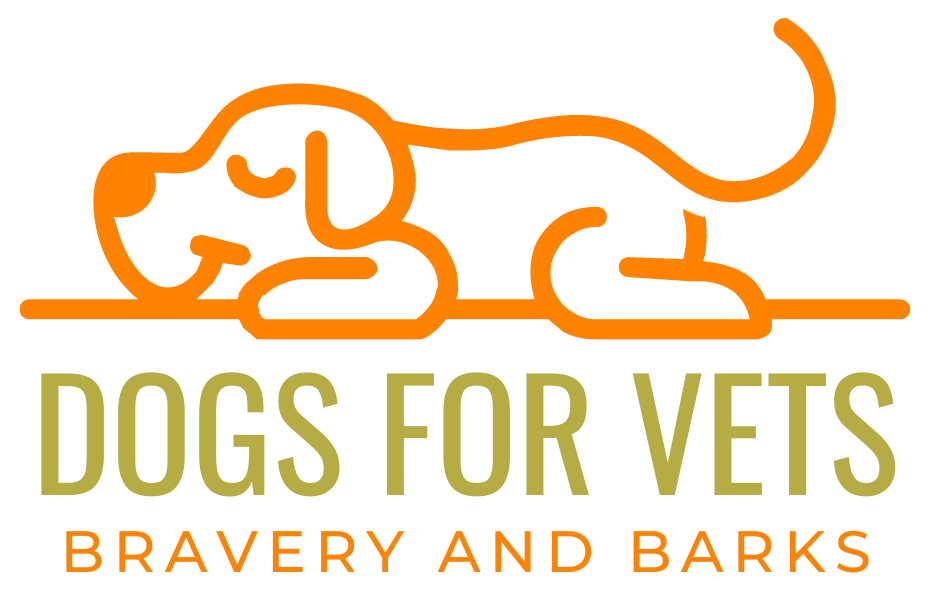This post may contain ads and affiliate links and we may earn a small commission when you click on the links at no additional cost to you. As an Amazon Affiliate, we earn from qualifying purchases. You can read our full disclaimer here.
Dog Food Recipes for Senior Dogs: Nutrition for Golden Years
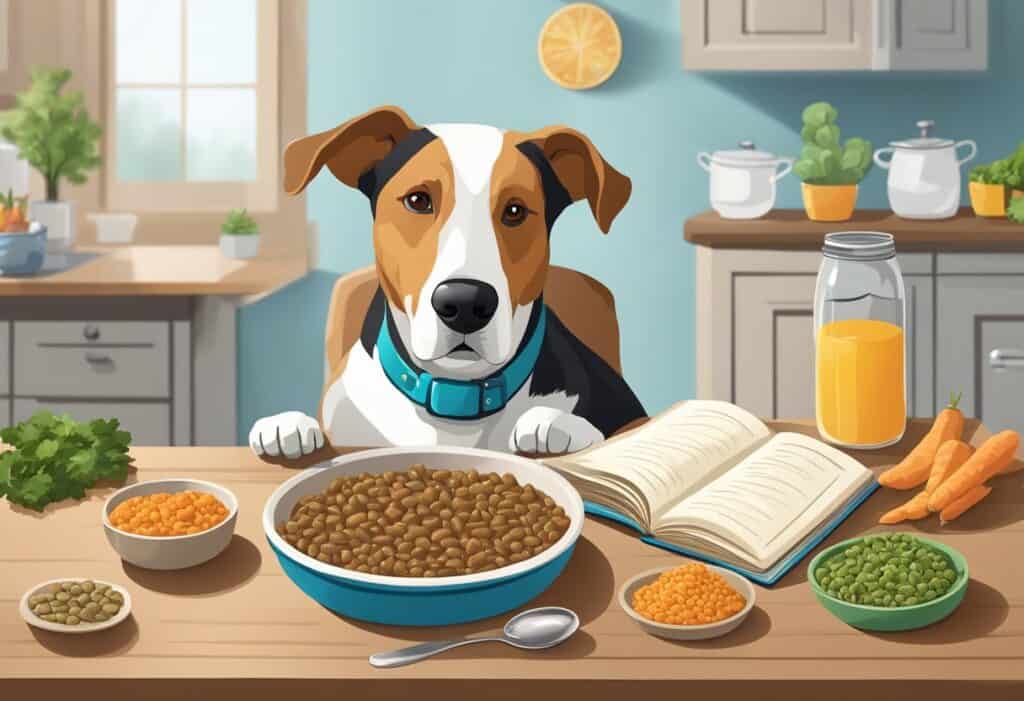
As your dog reaches its senior years, its dietary needs evolve. Aging can change their metabolism and energy requirements, making it critical to adjust their nutrition to maintain optimal health.
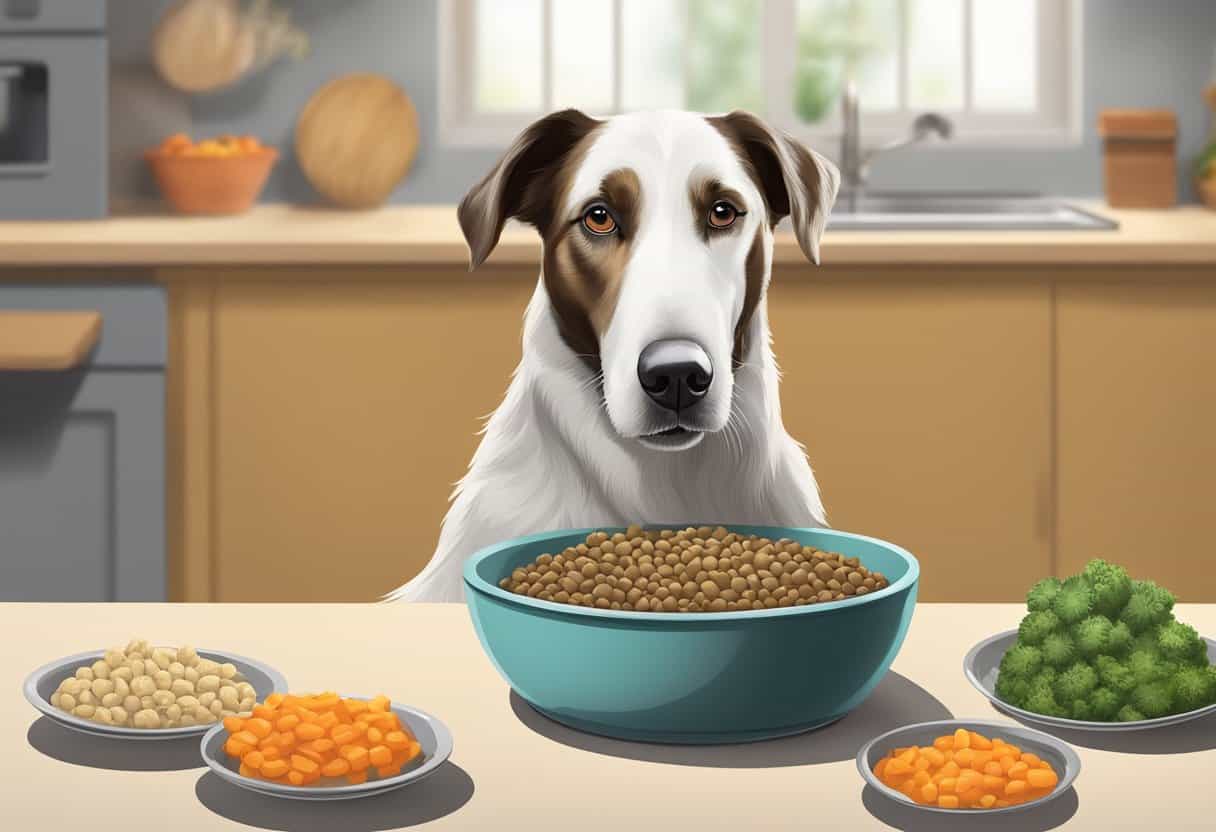
When creating dog food recipes for senior dogs, it’s essential to focus on easily digestible ingredients that are rich in nutrients while being moderate in calories.
Since older dogs are less active, they require fewer calories, yet they still need a balanced diet that includes the right mix of protein, fats, and carbohydrates, along with vitamins and minerals to support their aging bodies.
Impatient? Click here to go straight to the recipes!
Navigating health issues commonly associated with aging dogs—such as decreased kidney function, arthritis, or dental problems—requires thoughtful meal planning.
By opting for specific ingredients that support joint health, enhance cognitive function, and cater to sensitive teeth, you can help alleviate some of the discomforts your senior dog may face.
Remember, a well-planned diet can significantly improve your senior dog’s quality of life.
Understanding Senior Dogs’ Nutritional Requirements
As your dog ages, you need to adjust their diet to maintain their health and address age-related issues.
The Role of Diet in Senior Dog Health
Your senior dog’s dietary needs change with age. A balanced diet rich in essential nutrients helps manage weight, sustain muscle mass, and support organ function.
Protein is crucial for maintaining muscle, but needs may decrease if kidney issues are present.
Meanwhile, lower-calorie foods prevent obesity, a common challenge for less active senior dogs.
It’s important to balance omega fatty acids to support joint health and cognitive function.
- Key Nutrients for Senior Dogs:
- Proteins: Moderate to high, easily digestible
- Fats: Controlled levels for energy
- Fiber: For gastrointestinal health
- Vitamins and Minerals: Tailored to address specific health needs
Identifying Common Health Issues and Nutritional Needs
Senior dogs often face health challenges such as arthritis, heart problems, and diminished organ functions.
Calories need to be monitored closely to prevent weight gain, which can exacerbate health conditions.
A diet rich in vitamins A, E, and C along with minerals like potassium, magnesium, iron, and zinc can support immune health and overall well-being.
Health Conditions Influencing Diet:
- Joint issues: Increase Omega-3 fatty acids
- Dental problems: Soft or wet food options
- Digestive issues: Higher fiber content for gut health
Consulting with a Veterinarian for Customized Advice
A veterinarian can best assess the specific nutritional needs based on your senior dog’s health profile.
Customized dietary plans can address issues like kidney function, where lower protein and phosphorus may be recommended, or heart disease, where lower sodium diets can be beneficial.
Always consult a professional before making dietary changes.
Veterinarian Recommendations May Include:
- Blood work: To determine deficiencies or excesses
- Diet plan: Tailored to your dog’s age and health condition
Essential Nutrients for Homemade Senior Dog Food
When preparing homemade food for your senior dog, it’s crucial to include a balanced mix of nutrients that support aging bodies. Here’s what to focus on to maintain their health and vitality.
Proteins: Building Blocks for Aging Muscles
Protein Source: Opt for lean meats like chicken, turkey, or fish as high-quality protein sources. Your senior dog needs these proteins to maintain muscle mass and repair tissues.
An appropriate protein content for senior dogs is about 25-30% of their diet.
Healthy Fats for Energy and Coat Health
Healthy Fats: Include sources of omega-3 and omega-6 fatty acids such as flaxseed oil or salmon oil.
These healthy fats not only provide energy but also keep your dog’s coat shiny and support brain health. Aim for fats to comprise about 10-15% of the homemade diet.
Fiber for Digestive Wellness
Fiber: Integrating sources of fiber such as pumpkin or sweet potato aids in digestion and keeps bowel movements regular.
This is especially important for senior dogs who may struggle with digestive issues. The fiber content in a senior dog food should be between 3-5%.
Vitamins and Minerals for Overall Wellbeing
Vitamins and Minerals: A balanced homemade diet must include a variety of vitamins and minerals to support overall health.
Incorporating vegetables like carrots and green beans provides vitamins A and C, while natural sources like eggshells or plain yogurt offer calcium for bone health.
Adding a vet-recommended multivitamin can ensure you’re meeting all nutritional needs, including crucial antioxidants which help combat cellular aging and support the immune system.
Popular Homemade Dog Food Ingredients
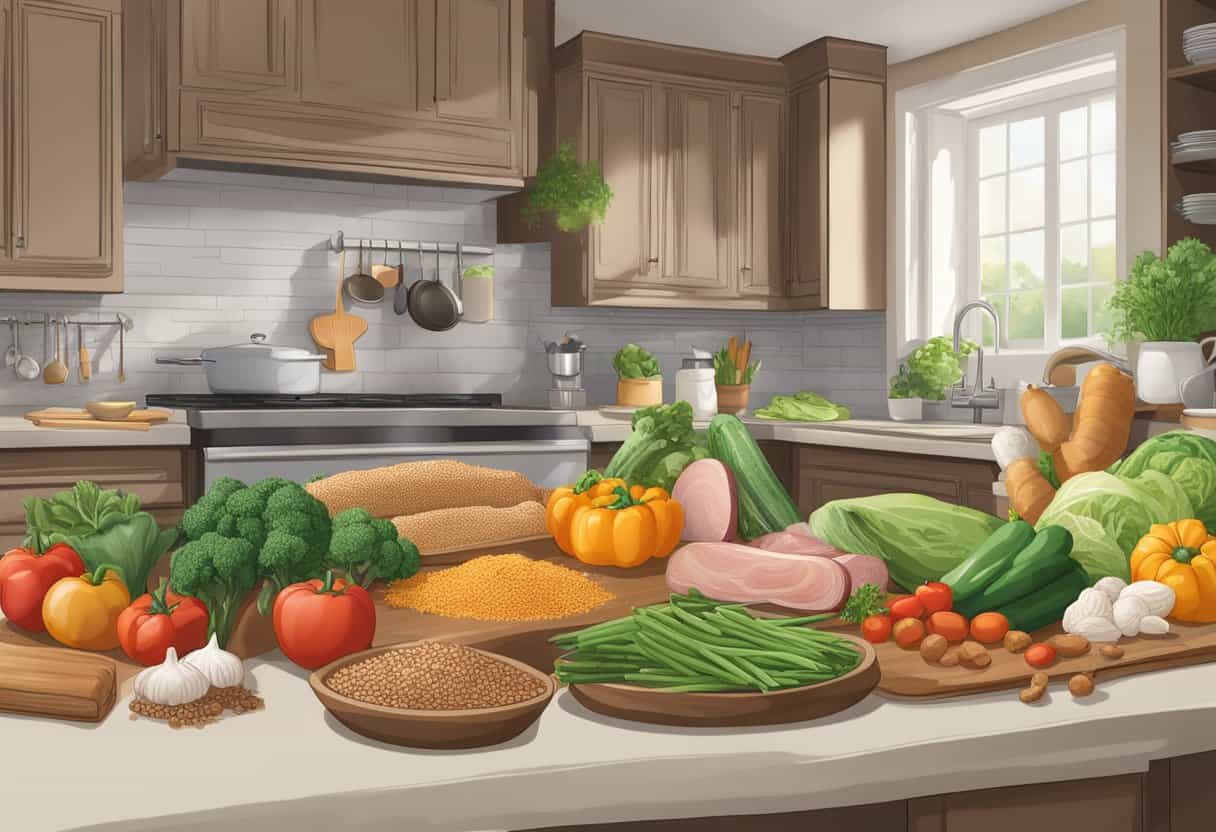
When preparing homemade dog food for your senior pet, incorporating balanced and age-appropriate ingredients is crucial for their health.
The ingredients listed below are commonly used to meet the nutritional needs of older dogs.
Quality Protein Sources: Chicken, Beef, and Turkey
Protein is essential for maintaining muscle mass and overall health in senior dogs.
Chicken, beef, and turkey are excellent sources of lean protein that are commonly used in homemade dog food recipes.
- Chicken: High in protein and low in fat, suitable for dogs with weight management needs.
- Beef: Rich in iron and B vitamins for energy.
- Turkey: Another lean protein source, leaner than chicken, and easily digestible.
Veggies for Vitamins: Carrots, Peas, and Green Beans
Vegetables are vital in providing vitamins and minerals that support a senior dog’s immune system, vision, and heart health.
- Carrots: High in fiber and beta-carotene, which converts to vitamin A.
- Peas: Contain vitamins K and B, and are a source of protein.
- Green Beans: Low in calories and packed with iron and vitamin C.
Grains and Carbohydrates: Brown Rice and Potatoes
Grains and other carbohydrate sources offer energy and dietary fiber, which can help with digestion in senior dogs.
- Brown Rice: Full of fiber and a source of carbohydrates for energy.
- Potatoes: High in potassium and carbohydrates for maintaining energy levels. Ensure they are cooked and avoid green potatoes due to toxicity.
Supplements and Unique Additives: Pumpkin, Parsley, and Rosemary
Additional supplements and herbs can enhance the taste and nutritional value of senior dog food, addressing specific health concerns like digestive issues or inflammation.
- Pumpkin: A great source of fiber and beta-carotene. Helps with digestive health.
- Parsley: Freshens breath and provides flavonoids, antioxidants, and vitamins.
- Rosemary: Natural preservative with anti-inflammatory properties. Use in moderation.
Step-by-Step Dog Food Recipes for Senior Dogs
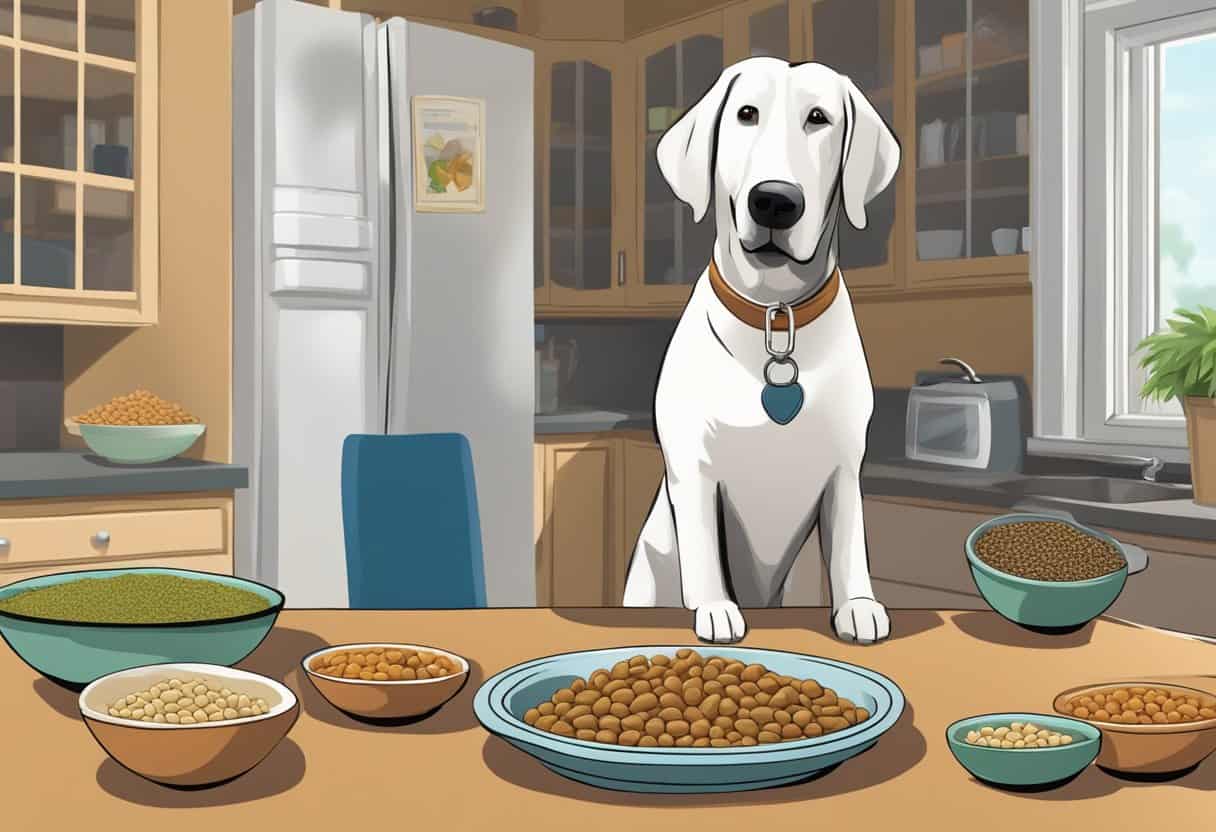
Homemade food can offer your senior dog a well-rounded diet tailored to their needs. Here are nutritious recipes designed with your aging companion’s health in mind.
Nutritionally Balanced Beef Stew
Ingredients:
- 1.5 pounds of lean beef, chopped
- 1 sweet potato, diced
- 1/2 cup of carrots, sliced
- 1/2 cup of green beans, chopped
- 1/2 tablespoon of fish oil
- Water
Instructions:
- In a large pot, add enough water to cover the ingredients.
- Add in the lean beef and cook over medium heat for approximately 15 minutes.
- Put the sweet potato, carrots, and green beans into the pot and continue to cook until the vegetables are tender, about 15 more minutes.
- Stir in the fish oil after removing the pot from the heat.
- Allow the stew to cool before serving to ensure it’s at a safe temperature for your dog.
Dog Food Recipes for Senior Dogs: Homemade Chicken and Rice Formula
Ingredients:
- 1.5 pounds of boneless chicken, cubed
- 1 cup of brown rice
- 1/2 cup of peas
- 1/2 cup of carrots, sliced
- 4 cups of low-sodium chicken broth
Instructions:
- In a large pot, bring the chicken broth to a boil and add the chicken and rice.
- Reduce heat to a simmer and cook until the chicken is fully done, approximately 25 minutes.
- Add the peas and carrots, then simmer for an additional 10 minutes.
- Let the mixture cool to avoid burns before feeding your dog.
Dog Food Recipes for Senior Dogs: Wholesome Turkey and Veggies Mix
Ingredients:
- 1.5 pounds of ground turkey
- 1 cup of cauliflower florets
- 1/2 cup of carrots, diced
- 1/2 cup of kale, chopped
- 1 tablespoon of olive oil
- Water
Instructions:
- Cook the ground turkey in a skillet over medium heat until browned.
- Steam the cauliflower, carrots, and kale until softened but not mushy.
- Combine turkey and vegetables in a large bowl, adding the olive oil to mix.
- Once the food has cooled, serve the appropriate portion size for your senior dog.
Safe Preparation and Storage of Dog Food
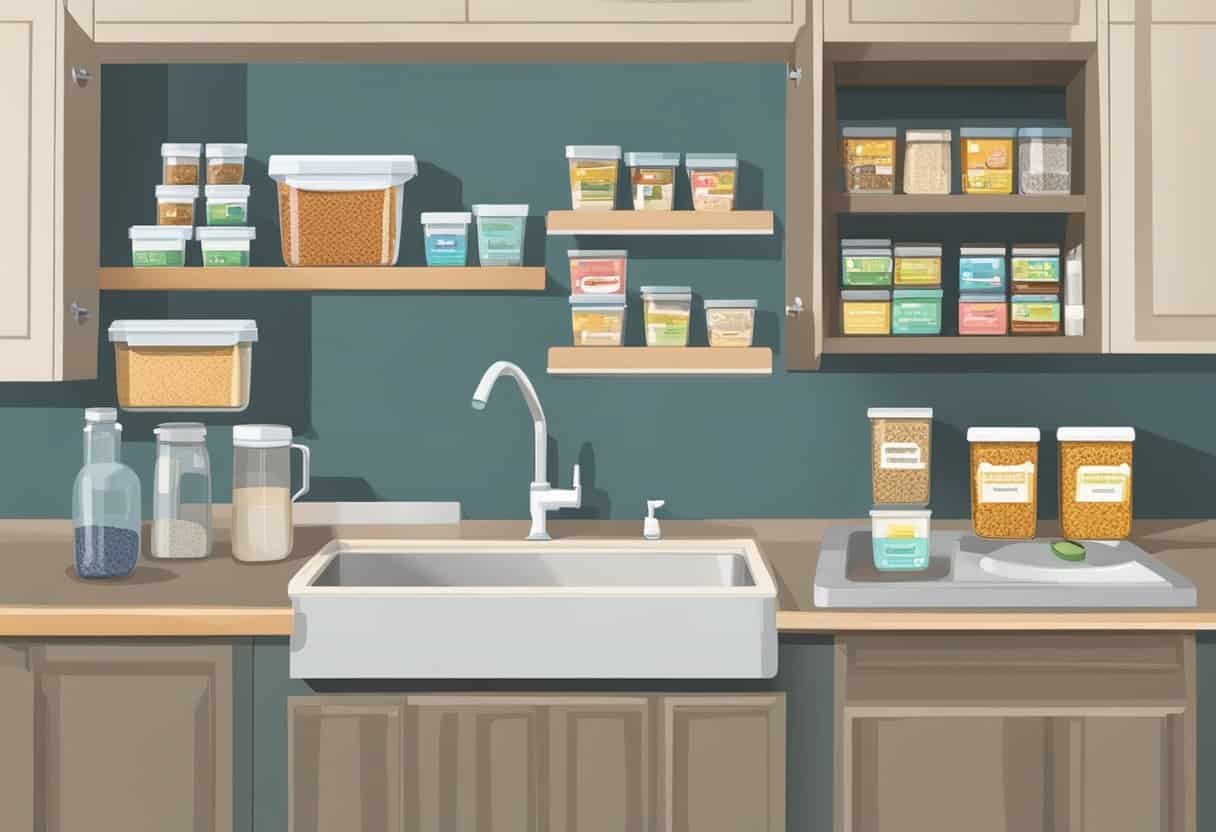
Proper handling and storage are crucial for the health of your senior dog.
Paying attention to clean preparation areas and the right storage techniques can prevent foodborne illnesses and ensure the nutritional quality of the food you serve.
Maintaining a Clean Kitchen for Dog Food Prep
Maintaining a clean kitchen is essential when preparing dog food.
Ensure that all surfaces are thoroughly disinfected before you begin.
Use separate cutting boards and utensils for different ingredients to avoid cross-contamination.
Keep your kitchen well-organized and clean up spills immediately to create a safer environment for food prep.
- Surfaces: Disinfect counters and cutting boards before and after use.
- Utensils: Allocate specific utensils for dog food preparation.
Proper Food Handling to Prevent Diseases
Handling ingredients correctly is vital in preventing diseases.
Wash your hands with soap and water before and after handling any dog food ingredients.
Cook meats to the appropriate temperature to kill harmful bacteria.
If your dog has food sensitivities, be sure to avoid any problematic ingredients.
Consider incorporating natural preservatives, like antioxidants, that are safe for dogs instead of harmful chemical preservatives.
- Hand Washing: Soap and water for at least 20 seconds.
- Cooking: Meat temperatures should reach safe levels to kill pathogens.
Storing Homemade Dog Food: Tips and Tricks
Store your homemade dog food properly to maintain its freshness and nutritional value.
Use airtight containers to keep the food free from contaminants and to preserve moisture content.
Refrigerate or freeze portions depending on how soon you intend to use them.
Remember, homemade dog food lacks the preservatives found in commercial dog food, so it will not last as long. Be mindful of expiration dates and when in doubt, throw it out.
- Refrigeration: Store dog food in the fridge if you’ll use it within a few days.
- Freezing: For longer storage, portion the food and freeze.
- Containers: Always opt for airtight containers to keep the food fresh.
Considerations for Feeding Senior Dogs
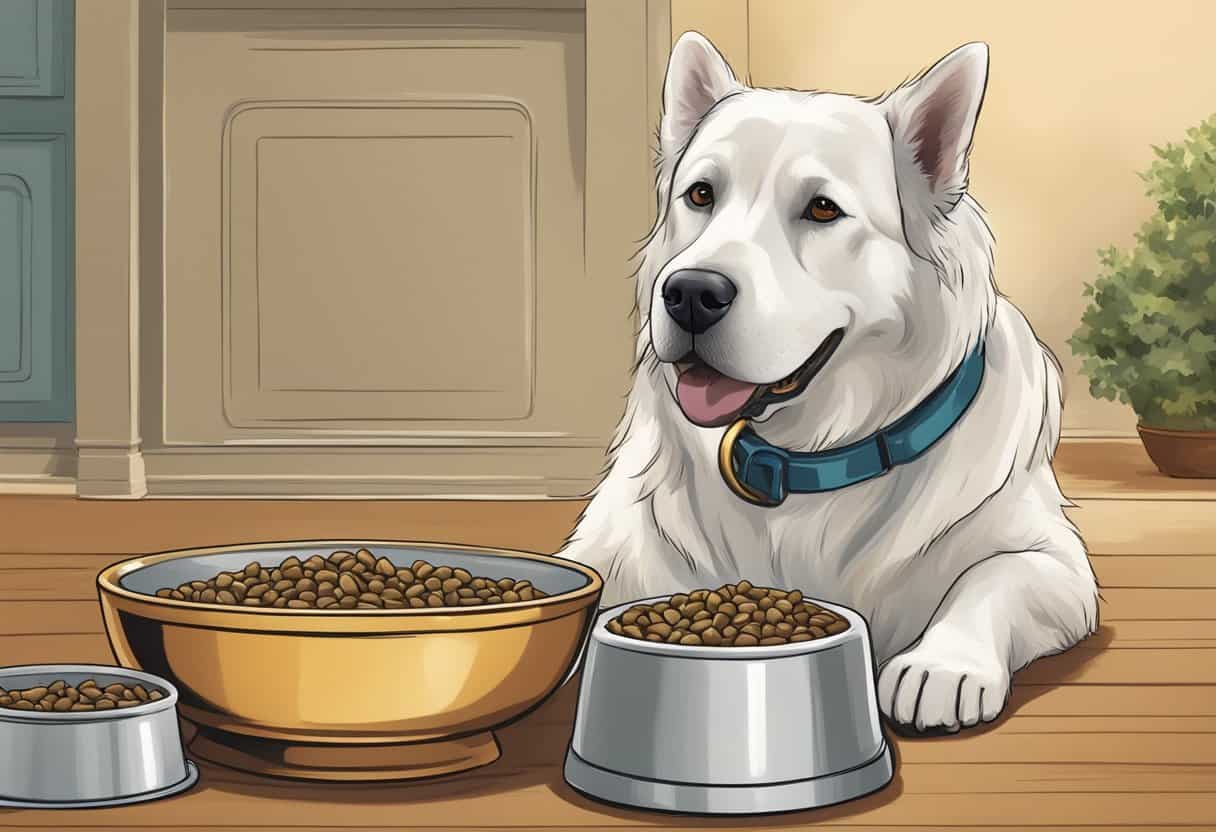
As dogs age, their nutritional needs and feeding routines may change. It’s important to adapt their diet to maintain their health and well-being during their senior years.
Determining the Correct Serving Size for Your Dog
To ensure your senior dog maintains a healthy body weight and doesn’t develop obesity, adjust their serving size based on their activity level and metabolism. Use the following table as a guide:
| Body Weight (lbs) | Low Activity | Moderate Activity | High Activity |
|---|---|---|---|
| 10 lb | 1/4 cup | 1/3 cup | 1/2 cup |
| 20 lb | 1/3 cup | 1/2 cup | 3/4 cup |
| 30 lb | 1/2 cup | 3/4 cup | 1 cup |
| 50 lb | 3/4 cup | 1 cup | 1 1/3 cups |
| 70+ lb | 1 cup | 1 1/3 cups | 1 3/4 cups |
Adjust amounts as necessary based on your dog’s specific needs, and consult your veterinarian for tailored advice.
Addressing Special Dietary Requirements
Senior dogs may develop health conditions that require special diets.
For instance, if your dog has food allergies, select ingredients that won’t trigger allergic reactions.
Dogs with kidney issues may need lower protein content, while those with arthritis might benefit from anti-inflammatory additives like omega-3 fatty acids.
Always consult your vet when addressing these dietary needs to ensure the nutritional value of the food supports your dog’s health.
Adjusting the Diet for Changing Energy Levels
As your dog ages, their energy levels often decrease, which can affect their metabolism.
A lowering in activity levels implies less caloric intake is needed.
Serve meals in a bowl that promotes slow eating to help with digestion, and always make sure fresh water is readily available.
Aim to provide a balanced diet that sustains your dog’s energy while preventing weight gain due to reduced activity.
Homemade Treats and Supplements
Crafting nutritious snacks for your senior dog supports their health and supplements can aid in maintaining joint and heart function as they age.
Creating Healthy Treats: Peanut Butter and Blueberries
You can make healthy treats that your senior dog will love.
Start with a simple dog biscuit recipe using whole ingredients like oats and flaxseed.
For added flavor and nutrition, incorporate peanut butter—a source of healthy fats and protein—and blueberries, which are rich in antioxidants.
Here’s a quick recipe to create these treats:
- Preheat your oven to 350°F (175°C).
- Mix 2 cups of whole oat flour, 1/2 cup of peanut butter, and 1 cup of pureed blueberries.
- Roll out the dough and cut into desired shapes.
- Bake for 20-25 minutes until lightly browned.
- Let cool before serving.
Selecting Supplements for Joint and Heart Health
Choosing the right supplements is crucial for your senior dog’s joint and heart health. Look for these specific ingredients:
- Glucosamine and Chondroitin: These are beneficial for joint health, helping to maintain cartilage and reduce joint pain.
- Omega-3 Fatty Acids: Found in supplements like fish oil or salmon oil, which support heart health and can also aid in reducing inflammation in the joints.
| Supplement | Benefit | Suggested Form |
|---|---|---|
| Glucosamine & Chondroitin | Supports joint health | Chewable Tablet |
| Omega-3 Fatty Acids (EPA & DHA) | Promotes heart health & reduces joint inflammation | Liquid Fish Oil |
When selecting supplements, ensure they are designed for senior dog food requirements and always consult with your veterinarian before adding any new supplement to your dog’s diet.
Transitioning to Homemade Senior Dog Food
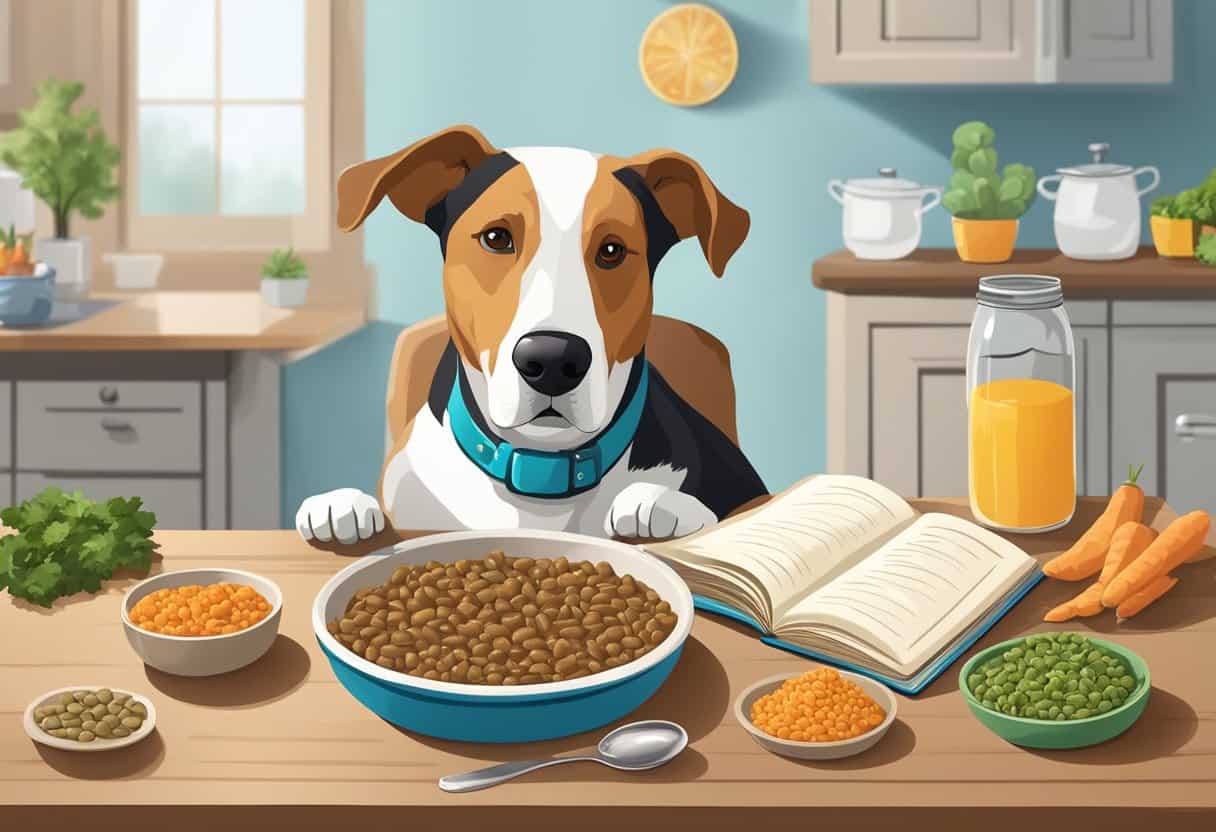
When you decide to switch your senior dog to homemade food, it is crucial to ensure that the diet is nutritionally balanced, tailored to their health condition, and free from ingredients that may trigger allergies.
Making this transition requires careful planning.
Before introducing homemade meals, consult with a veterinarian to assess your dog’s specific nutritional needs.
Aging dogs have different requirements than younger ones, and any chronic health issues could influence the diet.
Steps for Transitioning:
- Gradual Introduction: Start by mixing a small amount of the homemade meal with the current food. Gradually increase the homemade portion over a week or two.
- Balance is Key: Prepare meals that are rich in proteins, fibers, and vitamins. Incorporate lean meats, healthy fats, and veggies that offer high nutritional value, such as carrots or green beans.
Table of Ingredients Proportion:
| Ingredient Type | Suggested Proportion |
|---|---|
| Protein (Meat) | 40-50% |
| Veggies | 20-30% |
| Carbs | 10-30% |
| Supplements | As recommended |
Note on Raw Diets: Some caregivers consider a raw dog food diet, which can be beneficial if managed correctly. However, raw diets pose risks such as bacterial contamination or unbalanced nutrition and may not be suitable for all senior dogs.
When crafting a fresh dog food plan, remember not every senior dog has the same dietary tolerance.
Monitor your dog’s reaction to the new diet, and be ready to make needed adjustments.
By staying informed and attentive, you can help support your senior companion’s well-being through a careful dietary transition.
Special Topics in Canine Nutrition
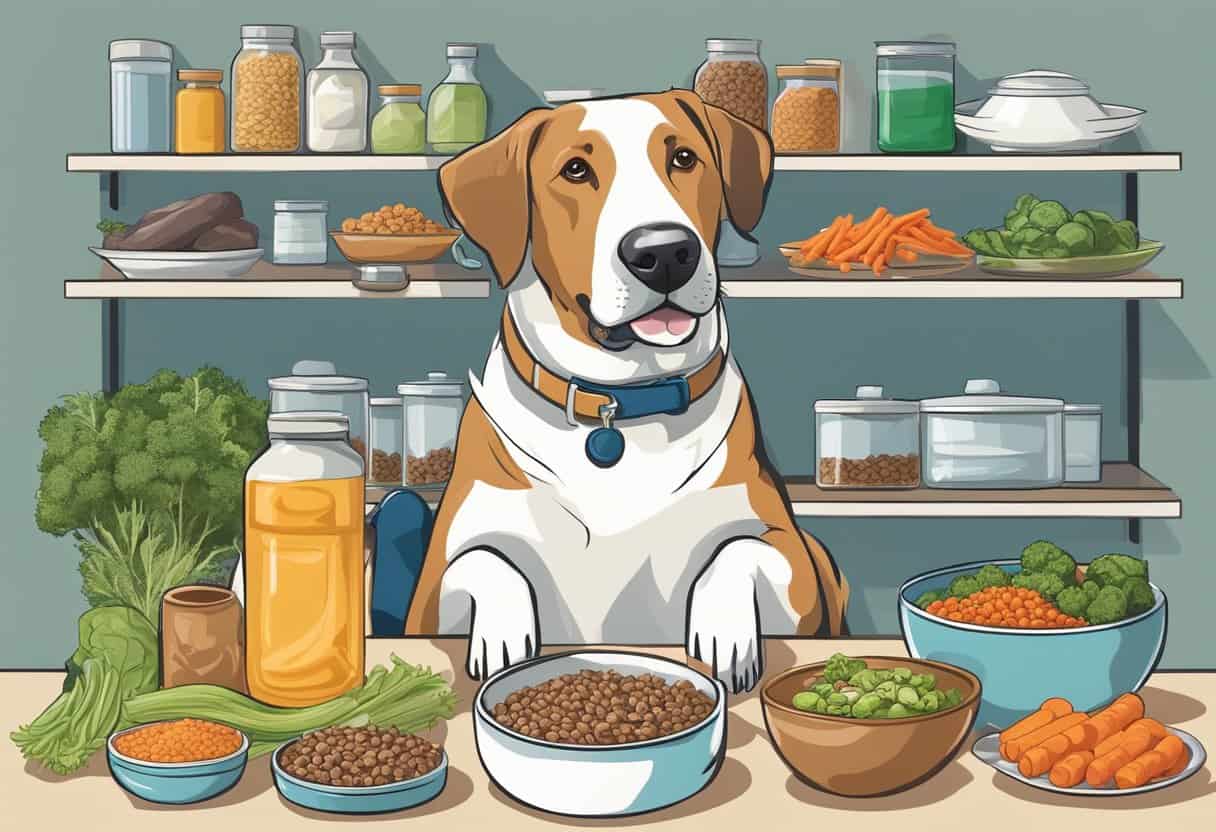
In formulating diets for senior dogs, it’s crucial to address weight management to prevent obesity, customize meals for dogs with food allergies or sensitivities, and recognize the significance of proper hydration.
Managing Weight and Preventing Obesity in Senior Dogs
Weight management is a critical aspect of senior canine nutrition. As dogs age, their metabolism slows down and they may become less active, increasing the risk of obesity.
It’s important for you to monitor your senior dog’s caloric intake and adjust portions accordingly.
Monitoring weight regularly is key. Consider the following:
- Calorie Control: Offer lower-calorie food rich in fiber and protein, which can help maintain a healthy weight without leaving your dog hungry.
- Regular Exercise: Pair their diet with consistent, gentle exercise to help manage weight.
Supporting Senior Dogs with Food Allergies or Sensitivities
Food allergies or sensitivities in senior dogs can lead to discomfort and various health issues. Personalizing your dog’s diet is important if they suffer from these conditions.
Here’s how you can support your senior dog:
- Identify Allergens: Work with your vet to identify specific ingredients that trigger allergic reactions or sensitivities.
- Homemade Diet Options: Prepare homemade meals with hypoallergenic components to alleviate symptoms and ensure they’re getting the necessary vitamins and minerals.
Role of Hydration in Senior Dog Diet
Hydration plays an integral role in senior dogs’ diet and health, crucial for proper organ function and digestion. Ensure your dog has constant access to clean water, and consider the following:
- Moisture-Rich Foods: Provide wet food or add water/broth to your dog’s meals.
- Monitor Water Intake: Keep an eye on how much your dog drinks to prevent dehydration.
Alternative Feeding Options for Dog Food Recipes for Senior Dogs
When caring for a senior dog, your main focus should be on providing a diet that supports their health and specific nutritional needs.
Commercial Senior Dog Food vs. Homemade
Commercial Senior Dog Food: It caters specifically to the dietary needs of older dogs and is scientifically formulated with balanced nutrients.
Many of these foods include glucosamine for joint health and are lower in calories, which is well-suited for your dog’s slower metabolism. However, they often contain preservatives that prolong shelf life.
| Commercial Food Pros | Commercial Food Cons |
|---|---|
| Convenient | May contain preservatives |
| Nutritionally balanced | Less customizable |
| Includes senior-specific supplements | Potentially more expensive per serving |
Homemade Dog Food: This option allows you to control the ingredients and can be tailored to your dog’s specific health needs or diseases.
Homemade meals can be rich in nutrients when prepared correctly. Still, they necessitate a solid understanding of a dog’s nutritional requirements to avoid deficiencies.
| Homemade Food Pros | Homemade Food Cons |
|---|---|
| Customizable for specific health issues | Requires time and knowledge to prepare |
| Fresh, with no preservatives | Risk of nutritional deficiencies |
| Can potentially increase lifespan and vitality | Might not be cost-effective in the long run |
Raw Diets for Senior Dogs: Pros and Cons
Raw Diets: A raw diet typically consists of raw meat, bones, fruits, and vegetables, aiming to mimic what dogs would eat in the wild. Proponents argue these diets may enhance your dog’s coat, teeth health, and digestion.
| Raw Diet Pros | Raw Diet Cons |
|---|---|
| May reflect a more natural diet | Risk of bacterial contamination |
| Can lead to improved coat and teeth health | Requires careful balance to be nutritionally complete |
| Potentially better digestibility | Not suitable for all breeds or dogs with certain diseases |
On the flip side, raw diets can be high-risk for senior dogs if not managed properly. They can expose your dog to bacteria and pathogens, and may not provide all the necessary nutrients to support an aging immune system.
Always consult your veterinarian before making a diet change, especially if your senior dog has any pre-existing health issues.
Final Thoughts About Dog Food Recipes for Senior Dogs
When crafting meals for your senior dog, prioritizing their diet and nutrition is essential. Senior dogs often have different dietary needs due to their less active lifestyle and changing health conditions.
Consult with your veterinarian to ensure any homemade food provides a balanced diet that’s tailored to your pet’s specific needs.
Remember the following key points when preparing dog food:
- Health Condition: Adjust ingredients to support specific health issues, being mindful of your senior dog’s digestive system and energy requirements.
- Nutrition: Focus on high-quality proteins, healthy fats, and digestible carbohydrates. Supplements can be added with veterinary guidance to address any nutritional gaps.
- Veterinarian Advice: Your veterinarian can offer invaluable insight, especially regarding portion sizes and the nutritional content suitable for your dog’s age and health.
Incorporate these elements into your dog food:
| Nutrient | Purpose | Examples |
|---|---|---|
| Protein | Muscle maintenance | Lean meats, eggs |
| Fats | Energy and cell function | Flaxseed, fish oil |
| Carbohydrates | Digestible energy | Brown rice, sweet potatoes |
| Fiber | Digestive health | Pumpkin, apples |
| Vitamins/Minerals | Overall health support | Vet-recommended supplements |
Ensure that any diet alterations are introduced gradually to allow your senior dog to adjust without undue stress.
Nutrition is a critical component of your senior dog’s overall well-being, so approach changes methodically and always aim to maintain a state of nutritional balance tailored to their unique needs.
Frequently Asked Questions About Dog Food Recipes for Senior Dogs
When preparing a homemade diet for your senior dog, it’s essential to focus on the right nutrients, balance, and specific needs due to aging, such as dental issues.
What homemade food recipes are recommended for senior dogs with dental issues?
Opt for soft, wet foods that are easier to chew. Slow-cooked stews with tender meats and softly cooked vegetables are a great option for maintaining nutrition without causing discomfort.
Which supplements should I consider adding to my senior dog’s homemade meals?
Glucosamine and chondroitin can support joint health, while omega fatty acids can help maintain a healthy coat and skin. Always consult your vet before adding any supplements to your dog’s diet.
What is a simple and nutritious homemade food recipe for an older dog?
A basic recipe could include a lean protein like cooked chicken, a carbohydrate like mashed sweet potato, and a vegetable like spinach, all mixed with a little water or unsalted chicken broth to keep it moist.
Are there any specific ingredients to avoid in homemade food for senior dogs?
Avoid ingredients that are high in fat and difficult to digest, like bacon or heavy creams. Also, steer clear of foods that are toxic to dogs, such as onions, garlic, and chocolate.
-
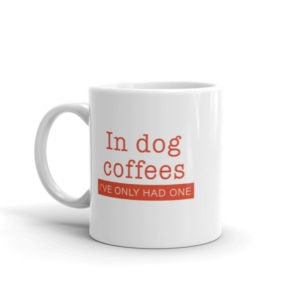
Coffee Mug – In Dog Coffees I’ve Only Had One
$11.95 – $14.95 Select options This product has multiple variants. The options may be chosen on the product page
